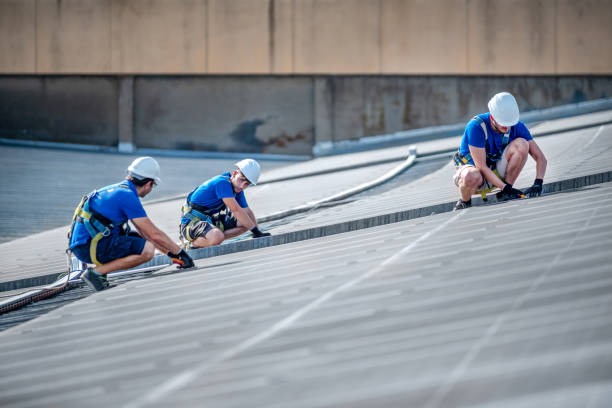
When it comes to maintaining a building's roof, understanding the distinction between commercial and residential roof repair is essential. While both serve the same ultimate purpose—protecting a structure from the elements—the methods, materials, scope, and challenges involved in these two types of repairs can differ significantly. Knowing these differences helps property owners make informed decisions and ensures they choose the right Roofing Service to address their specific needs. For property owners seeking expert Commercial roof repair in Melbourne FL, having a professional on their side can make all the difference in long-term results and cost efficiency.

The first and most noticeable difference between residential and commercial roofs lies in their structure. Residential roofs tend to be steeply sloped, typically with asphalt shingles, tiles, or wood shakes. In contrast, commercial roofs are usually flat or have a very low slope. This fundamental design difference greatly influences the materials used and the method of repair. Flat commercial roofs often require complex drainage systems, and repairs may involve sealing large surface areas or installing specialized membranes.
Residential and commercial roofs utilize different materials due to their distinct structures and purposes. A residential roof often uses shingles, slate, or metal panels. These materials are generally easier to install and replace. On the other hand, commercial roofs are frequently constructed with modified bitumen, thermoplastic membranes like TPO or PVC, or built-up roofing systems. Repairing these materials often demands specialized tools and techniques, which is why working with a trained roofing contractor is vital for commercial buildings.
Commercial roofs are typically more complex in terms of the systems integrated into them. HVAC units, ventilation systems, drainage pipes, and sometimes even solar panels are often part of commercial roof structures. This complexity means that commercial roof repair not only requires knowledge of roofing systems but also an understanding of mechanical systems. Residential roof repairs, while still technical, are often simpler in scope, focusing on localized shingle replacement or minor leak fixes.
The scope of a roof inspection also differs between commercial and residential properties. A commercial roof inspection involves a detailed review of large surface areas, seals around HVAC systems, membrane condition, and drainage systems. Due to the size and flatness of most commercial roofs, issues such as pooling water or membrane separation are common and can be harder to spot without professional assessment. In residential settings, inspections usually focus on shingle condition, flashing integrity, and attic ventilation. In either case, scheduling regular inspections through a reliable roofing service helps avoid extensive and costly damage.
The repair process and tools used vary significantly between the two roof types. Commercial repairs often require the application of heat-welded membranes, advanced sealing materials, and larger-scale scaffolding or lifts due to the building's height and accessibility issues. Residential repairs usually need basic tools like nail guns, hammers, and roofing cement. This difference means that technicians who handle roof damage repair in Melbourne FL must be highly trained and equipped for more technical repair environments.
Due to size and complexity, commercial roof repairs are typically more expensive than residential repairs. A commercial repair might involve thousands of square feet of membrane replacement or extensive water damage assessment, which significantly increases labor and material costs. While a roof repair on a home might only involve a few shingles and take a few hours, a similar issue on a commercial building could take several days. However, both types of repairs benefit from early detection and preventive care, which can save money over time.
Commercial roofing is often subject to more stringent building codes and regulations, especially in states like Florida where hurricane preparation is crucial. A certified roofing contractor must ensure compliance with these codes to avoid penalties or increased insurance premiums. Additionally, warranties for commercial roofs are usually more comprehensive and require that repairs and inspections be documented meticulously. Residential warranties are often less complex but may still require maintenance records to remain valid.
The impact of roof damage repair also differs between residential and commercial properties. In a residential setting, damage can disrupt the family's comfort and safety. For businesses, however, roof damage can interrupt operations, cause inventory loss, and create unsafe conditions for employees and customers. As a result, commercial roof repair needs to be handled promptly and efficiently to prevent business disruption.
Ongoing maintenance is critical for both residential and commercial roofs but in different ways. A home might require seasonal gutter cleaning, shingle checks, and attic ventilation monitoring. In contrast, a commercial property usually needs a scheduled maintenance plan that includes checking roof membranes, cleaning debris from drainage systems, and assessing wear on rooftop equipment seals. Maintenance services delivered by a specialized roofing service are essential for both, but commercial buildings often require more frequent and detailed maintenance schedules.
Choosing the right roofing contractor is vital, whether you need residential or commercial repairs. For homeowners, a contractor with experience in shingle replacement and localized leak repairs is ideal. For commercial property managers, it's important to hire a contractor who specializes in large-scale flat roofing systems and is familiar with local commercial building codes. In Melbourne FL, working with a contractor who understands local weather conditions and the materials that perform best in the region will yield better results and longer-lasting repairs.
Understanding the key differences between commercial and residential roof repair can help property owners take the right approach when issues arise. From design and material differences to repair techniques, cost, and regulation, each type of roofing system comes with its own set of challenges and requirements. Professional commercial roof repair in Melbourne FL ensures that your business is protected by experienced hands who understand the unique needs of commercial roofing systems. Regular roof inspections, proactive roof damage repair, and maintenance by a reliable roofing contractor are essential steps in prolonging the life of any roof. Whether you're maintaining a home or managing a business property, a trusted roofing service will provide the support and expertise you need to stay protected.